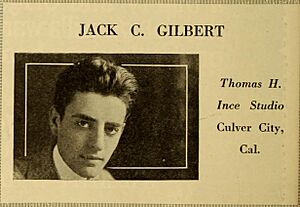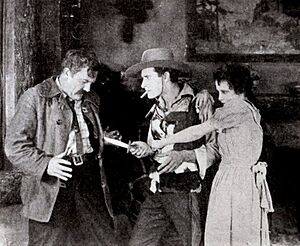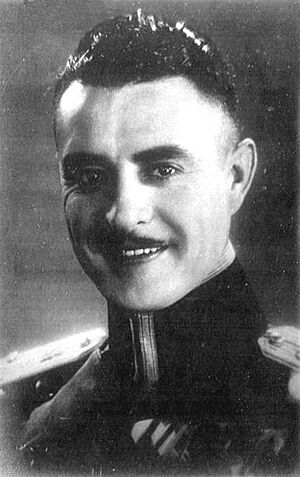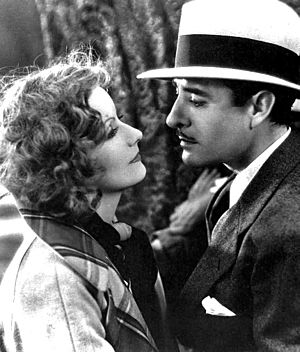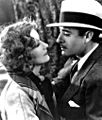John Gilbert (actor) facts for kids
Quick facts for kids
John Gilbert
|
|
|---|---|
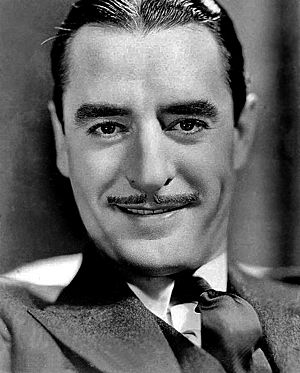
John Gilbert in 1931
|
|
| Born |
John Cecil Pringle
July 10, 1897 Logan, Utah, U.S.
|
| Died | January 9, 1936 (aged 38) Los Angeles, California, U.S.
|
| Resting place | Forest Lawn Memorial Park, Glendale |
| Other names | Jack Gilbert |
| Education | Hitchcock Military Academy |
| Occupation |
|
| Years active | 1914–1934 |
| Spouse(s) |
Olivia Burwell
(m. 1918; div. 1921)Ina Claire
(m. 1929; div. 1931) |
| Children | 2 |
John Gilbert (born John Cecil Pringle; July 10, 1897 – January 9, 1936) was an American actor, screenwriter, and director. He became very famous during the silent film era. People knew him as "The Great Lover" because of his romantic roles. His biggest successes came in 1925 with movies like The Merry Widow and The Big Parade. At the peak of his career, Gilbert was as popular as Rudolph Valentino.
When movies started having sound (called "talkies"), Gilbert's career changed a lot. Many people thought his voice was the problem. However, his career decline was more about studio decisions and money issues than his actual voice, which was quite good.
Contents
Early Life and First Jobs
John Cecil Pringle was born in Logan, Utah. His parents were actors who worked in traveling theater groups. Because of this, his family moved around a lot. Young "Jack" went to many different schools across the United States. When his family finally settled in California, he went to Hitchcock Military Academy.
After school, Gilbert worked as a salesman in San Francisco. Then, he started performing with a theater group in Portland, Oregon, in 1914. The next year, he found work as a stage manager in Spokane, Washington. But that job didn't last long because the theater company closed.
Becoming a Film Star
After losing his theater job in 1915, Gilbert decided to try acting in movies. He quickly found work as an extra. His first movie was The Mother Instinct (1915). He then worked as an extra in other films like The Coward (1915) and Hell's Hinges (1916).
Early Film Roles
In his first few years, Gilbert also appeared in films by the Kay-Bee Company. His first important co-starring role was in The Apostle of Vengeance. At this time, studio bosses saw him as a promising young actor. He was paid $40 a week, which was good money back then. Gilbert continued to get bigger parts at Kay-Bee. He was called "Jack Gilbert" in movies like The Aryan (1916) and Princess of the Dark (1917). Princess of the Dark was his first main role, but it wasn't a big hit. So, he went back to playing supporting characters for a while.
Moving to Other Studios
Gilbert then worked for Triangle Films. He appeared in movies like The Mother Instinct (1917) and Golden Rule Kate (1917). He also made films for other companies, including Shackled (1918) and The Mask (1918). He even worked with famous actress Mary Pickford in Heart o' the Hills (1919).
Actor, Writer, and Director
Later, a director named Maurice Tourneur signed Gilbert to a contract. This meant Gilbert would both act and write for films. He acted in and helped write The White Circle (1920) and Deep Waters (1921). He also wrote and directed a movie called Love's Penalty (1921), but he didn't act in it.
Becoming a Leading Man at Fox
In 1921, Gilbert signed a three-year contract with Fox Film Corporation. This studio started casting him in romantic lead roles and promoted him as "John Gilbert." His first main role for Fox was in Shame (1921). He then starred in many other romantic films like Arabian Love (1922) and Monte Cristo (1922).
Gilbert also co-starred with Lon Chaney in While Paris Sleeps (1923). Back at Fox, he starred in films like Cameo Kirby (1923), directed by John Ford. He also worked with Norma Shearer in The Wolf Man (1923). His last films for Fox were in 1924.
Success at Metro-Goldwyn-Mayer (MGM)
With help from movie producer Irving Thalberg, Gilbert left Fox and moved to MGM. Here, he became a huge star in major movies. His career really took off with His Hour (1924). He then starred in He Who Gets Slapped (1924) with Chaney and Shearer.
The next year, Gilbert starred in two of MGM's most famous silent films: Erich von Stroheim's The Merry Widow and King Vidor's The Big Parade.
The Merry Widow (1925)
Gilbert was chosen to star in The Merry Widow. The director, Erich von Stroheim, wasn't happy about this at first. But they soon worked out their differences. Gilbert was amazed by how famous he was becoming. He said that acting, which he had once joked about, had brought him "success, riches and renown."
The Big Parade (1925)
Gilbert's next big role was in King Vidor's war-romance The Big Parade (1925). This movie became the second-highest earning silent film ever. Gilbert's acting as an American soldier during World War I was a highlight of his career. He played Jim Apperson, a Southern gentleman who, with his friends, experiences the difficulties of war. Gilbert felt a deep connection to making this movie.
After this, Vidor reunited Gilbert with some of his co-stars for La Bohème (1926), which also starred Lillian Gish. He then made another film with Vidor, Bardelys the Magnificent (1926).
Working with Greta Garbo
In 1926, Gilbert made Flesh and the Devil, his first movie with Greta Garbo. When they met on set, they had amazing chemistry right away. The director, Clarence Brown, noticed how well they worked together. Garbo and Gilbert soon started a very public romance, which their fans and MGM loved.
Gilbert then made The Show (1927) and Twelve Miles Out (1927) with Joan Crawford.
Gilbert and Garbo worked together again in Love (1927). This movie was based on a book by Leo Tolstoy. The title was changed to "Love" to highlight the real-life romance between the two stars.
Even though Edmund Goulding was the official director, Gilbert helped direct the romantic scenes with Garbo. He was one of the few people whose artistic ideas Garbo truly respected. MGM approved of this arrangement.
Gilbert made several other films, including The Cossacks (1928) and Four Walls (1928) with Joan Crawford. He also had a small appearance in Show People (1928).
Gilbert and Garbo worked together a third time in A Woman of Affairs (1928). His last silent film was Desert Nights (1929).
The Sound Era and Challenges
When sound came to movies, Gilbert's voice was actually good. However, the way he spoke in his first sound film made audiences laugh. This was because actors were told to speak in a very formal "stage" way, which sounded unnatural. His voice itself was rich and clear, similar to other actors who did well in talkies.
Gilbert signed a very profitable contract with MGM in 1928. It was worth $1,500,000. However, Gilbert often argued with the head of the studio, Louis B. Mayer, about creative and money matters.
In the musical comedy The Hollywood Revue of 1929 (1929), Gilbert and Norma Shearer performed a scene from Shakespeare's Romeo and Juliet. They did it first in the original way, then in a funny, modern slang version. This helped to fix any bad impressions from Gilbert's earlier sound performance.
His Glorious Night
Audiences were excited to see Gilbert in more romantic roles in sound films. His next movie was His Glorious Night (1929). Reviewers said audiences laughed nervously at his performance. The problem wasn't Gilbert's voice, but the awkward story and the overly passionate love scenes. In one scene, Gilbert kept kissing his co-star and saying "I love you" many times. This scene was later made fun of in other movies.
The "Squeaky Voice" Myth
There's a common myth that John Gilbert had a "squeaky voice" that ruined his career in sound films. This idea started after his performance in His Glorious Night in 1929. Some even rumored that Louis B. Mayer made Gilbert's voice sound higher on purpose.
However, film historians have studied the sound of his movies. They found that Gilbert's voice in His Glorious Night was the same as in his later sound films. They also found that his voice was actually "quite low" overall. Experts in the 1960s also checked the films and found that Gilbert's voice matched other actors on the same film. This means it's unlikely anyone changed his voice on purpose.
Film critic John Baxter said Gilbert had a "light speaking voice." This small issue was made into a big problem by both MGM and Gilbert himself. Despite what people thought about his voice, Louis B. Mayer still seemed to dislike Gilbert. This led to more rumors that Mayer deliberately gave Gilbert bad movie scripts and directors to try and end his contract.
Career Decline
MGM put Gilbert in a film called Redemption (1929). In this movie, Gilbert's strong screen presence seemed to be gone. He also continued to use the overly formal way of speaking that made audiences laugh.
MGM then put him in a more action-packed film, Way for a Sailor (1930), and Gentleman's Fate (1931). Gilbert became sad because he was getting worse films and had long breaks between movies. Even though MGM wanted to end his contract, Gilbert decided to finish all six movies he was signed for.
Gilbert's career got a temporary boost when MGM's production head, Irving Thalberg, gave him two projects that focused on characters. These films allowed Gilbert to show his acting skills. In The Phantom of Paris (1931), Gilbert played a charming magician who is wrongly accused of murder. He uses his disguises to find the real killer.
Downstairs (1932) was based on Gilbert's own story. In this movie, he played a tricky chauffeur. Both films were liked by critics and fans, but they didn't bring his career back to its former glory. He also appeared in West of Broadway (1931).
Gilbert finished his contract with MGM with a simpler movie called Fast Workers (1933). He left the studio in 1933, ending his $10,000 a week contract. The challenges at MGM and his declining success made him very tired and sad, affecting his health.
Queen Christina (1933)
Gilbert announced he was retiring from acting. He was working as an "honorary" director at Fox. But in August 1933, he signed a new contract with MGM. This happened because Greta Garbo insisted that Gilbert return to MGM to be her co-star in Queen Christina (1933). Garbo was the main star, with Gilbert's name listed below hers. Queen Christina was a success with critics, but it didn't help Gilbert feel better about himself or fully restart his career.
Columbia Pictures gave Gilbert his last chance for a comeback in The Captain Hates the Sea (1934). In this film, he gave a good performance as a tired and cynical writer. This was his final movie.
Personal Life
John Gilbert was married four times and had two daughters. His first marriage was in 1918 to Olivia Burwell. His second marriage was to actress Leatrice Joy in 1922. They had a daughter named Leatrice Gilbert (born in 1924). They divorced in 1925.
In 1929, Gilbert married actress Ina Claire. They divorced two years later. His fourth and final marriage was in 1932 to actress Virginia Bruce. She had recently co-starred with him in the movie Downstairs. They had a daughter named Susan Ann. Bruce later continued her acting career after their divorce in 1934.
Death
Gilbert had a serious heart attack in December 1935, which made him very unwell. He had a second heart attack at his home in Bel Air, Los Angeles on January 9, 1936, which was fatal.
A private funeral was held on January 11. Many famous people attended, including his two ex-wives, Leatrice Joy and Virginia Bruce, his two daughters, and stars like Marlene Dietrich and Gary Cooper.
Gilbert was cremated, and his ashes were placed at Forest Lawn Memorial Park, Glendale in Glendale, California.
For his work in movies, John Gilbert has a star on the Hollywood Walk of Fame. In 1994, he was honored with his image on a United States postage stamp.
Filmography
| Year | Films | Role | Notes |
|---|---|---|---|
| 1915 | The Coward | Minor role | Uncredited |
| 1915 | Matrimony | Extra | Short film Uncredited |
| 1915 | Aloha Oe | Extra | Uncredited |
| 1916 | The Corner | Extra | Uncredited |
| 1916 | Bullets and Brown Eyes | ||
| 1916 | The Last Act | Extra | Uncredited |
| 1916 | Hell's Hinges | Rowdy townsman | Uncredited |
| 1916 | The Aryan | Extra | Uncredited |
| 1916 | Civilization | Extra | Uncredited |
| 1916 | The Apostle of Vengeance | Willie Hudson | |
| 1916 | The Phantom | Bertie Bereton | |
| 1916 | Eye of the Night | Uncredited | |
| 1916 | Shell 43 | English Spy | |
| 1916 | The Sin Ye Do | Jimmy | |
| 1917 | The Weaker Sex | ||
| 1917 | The Bride of Hate | Dr. Duprez's Son | |
| 1917 | Princess of the Dark | "Crip" Halloran | |
| 1917 | The Dark Road | Cedric Constable | |
| 1917 | Happiness | Richard Forrester | Credited as Jack Gilbert |
| 1917 | The Millionaire Vagrant | James Cricket | |
| 1917 | The Hater of Men | Billy Williams | |
| 1917 | The Mother Instinct | Jean Coutierre | |
| 1917 | Golden Rule Kate | The Heller | |
| 1917 | The Devil Dodger | Roger Ingraham | |
| 1917 | Up or Down? | Allan Corey | |
| 1918 | Nancy Comes Home | Phil Ballou | Credited as Jack Gilbert |
| 1918 | Shackled | James Ashley | Credited as Jack Gilbert |
| 1918 | More Trouble | Harvey Deering | Credited as Jack Gilbert |
| 1918 | One Dollar Bid | Credited as Jack Gilbert | |
| 1918 | Wedlock | Granger Hollister | Credited as Jack Gilbert |
| 1918 | Doing Their Bit | Credited as Jack Gilbert | |
| 1918 | The Mask | Billy Taylor | Credited as Jack Gilbert |
| 1918 | Three X Gordon | Archie | Credited as Jack Gilbert |
| 1918 | The Dawn of Understanding | Ira Beasly | Credited as Jack Gilbert |
| 1919 | The White Heather | Dick Beach | Credited as Jack Gilbert |
| 1919 | The Busher | Jim Blair | Credited as Jack Gilbert |
| 1919 | The Man Beneath | James Bassett | Credited as Jack Gilbert |
| 1919 | A Little Brother of the Rich | Carl Wilmerding | |
| 1919 | The Red Viper | Dick Grant | Credited as Jack Gilbert |
| 1919 | For a Woman's Honor | Dick Rutherford | |
| 1919 | Widow by Proxy | Jack Pennington | Credited as Jack Gilbert |
| 1919 | Heart o' the Hills | Gray Pendleton | Credited as Jack Gilbert |
| 1919 | Should a Woman Tell? | The Villain | Credited as Jack Gilbert |
| 1920 | The White Circle | Frank Cassilis | Credited as Jack Gilbert Writer |
| 1920 | The Great Redeemer | Undetermined role | Uncredited Adaptation |
| 1920 | Deep Waters | Bill Lacey | Credited as Jack Gilbert Writer |
| 1921 | The Servant in the House | Percival | Credited as Jack Gilbert |
| 1921 | The Bait |
|
Lost film Writer |
| 1921 | Love's Penalty |
|
Writer, director, editor |
| 1921 | Shame | William Fielding/David Field | |
| 1921 | Ladies Must Live | The Gardener | Credited as Jack Gilbert |
| 1922 | Gleam O'Dawn | Gleam O'Dawn | |
| 1922 | Arabian Love | Norman Stone | |
| 1922 | The Yellow Stain | Donald Keith | |
| 1922 | Honor First | Jacques Dubois/Honoré Duboois | |
| 1922 | Monte Cristo | Edmond Dantes, Count of Monte Cristo | |
| 1922 | Calvert's Valley | Page Emlyn | Credited as Jack Gilbert |
| 1922 | The Love Gambler | Dick Manners | |
| 1922 | A California Romance | Don Patricio Fernando | |
| 1923 | While Paris Sleeps | Dennis O'Keefe | |
| 1923 | Truxton King | Truxton King | |
| 1923 | Madness of Youth | Jaca Javalie | |
| 1923 | St. Elmo | St. Elmo Thornton | Lost film |
| 1923 | The Exiles | Henry Holcombe | |
| 1923 | Cameo Kirby | Cameo Kirby | |
| 1924 | Just Off Broadway | Stephen Moore | |
| 1924 | The Wolf Man | Gerald Stanley | Lost film |
| 1924 | A Man's Mate | Paul | |
| 1924 | The Lone Chance | Jack Saunders | Lost film |
| 1924 | Romance Ranch | Carlos Brent | |
| 1924 | His Hour | Gritzko | |
| 1924 | Married Flirts | Guest at party | Cameo appearance Lost film |
| 1924 | He Who Gets Slapped | Bezano | |
| 1924 | The Snob | Eugene Curry | Lost film |
| 1924 | The Wife of the Centaur | Jeffrey Dwyer | Lost film |
| 1925 | The Merry Widow | Prince Danilo Petrovich | |
| 1925 | The Big Parade | James Apperson | |
| 1925 | Ben-Hur: A Tale of the Christ | Crowd extra in chariot race | Uncredited |
| 1926 | La Bohème | Rodolphe | |
| 1926 | Bardelys the Magnificent | Bardelys | |
| 1926 | Flesh and the Devil | Leo von Harden | |
| 1927 | The Show | Cock Robin | |
| 1927 | Twelve Miles Out | Jerry Fay | |
| 1927 | Man, Woman and Sin | Albert Whitcomb | |
| 1927 | Love | Captain Count Alexei Vronsky | Director (Uncredited) |
| 1928 | The Cossacks | Lukashka | |
| 1928 | Four Walls | Benny Horowitz | Lost film |
| 1928 | Show People | Himself | Cameo appearance Uncredited |
| 1928 | The Masks of the Devil | Baron Reiner | |
| 1928 | A Woman of Affairs | Neville "Nevs" Holderness | |
| 1929 | Desert Nights | Hugh Rand | Last silent film |
| 1929 | His Glorious Night | Captain Kovacs | Sound film debut |
| 1929 | The Hollywood Revue of 1929 | Himself | |
| 1930 | Redemption | Fedya | |
| 1930 | Way for a Sailor | Jack | |
| 1931 | Gentleman's Fate | Giacomo Tomasulo/Jack Thomas | |
| 1931 | The Phantom of Paris | Chéri-Bibi | |
| 1931 | West of Broadway | Jerry Seevers | |
| 1932 | Downstairs | Karl Schneider | Story |
| 1933 | Fast Workers | Gunner Smith | |
| 1933 | Queen Christina | Antonio | |
| 1934 | The Captain Hates the Sea | Steve Bramley |
Images for kids
See also
 In Spanish: John Gilbert para niños
In Spanish: John Gilbert para niños
 | James B. Knighten |
 | Azellia White |
 | Willa Brown |


